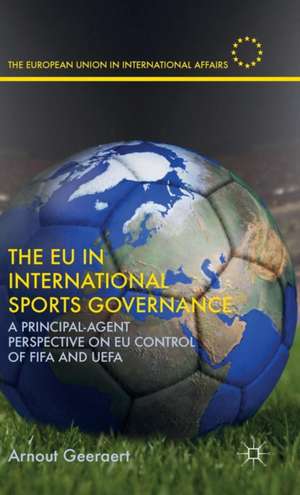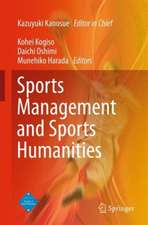The EU in International Sports Governance: A Principal-Agent Perspective on EU Control of FIFA and UEFA: The European Union in International Affairs
Autor A. Geeraerten Limba Engleză Hardback – 17 dec 2015
Din seria The European Union in International Affairs
- 15%
 Preț: 695.53 lei
Preț: 695.53 lei - 15%
 Preț: 499.12 lei
Preț: 499.12 lei -
 Preț: 351.66 lei
Preț: 351.66 lei -
 Preț: 392.60 lei
Preț: 392.60 lei - 18%
 Preț: 779.08 lei
Preț: 779.08 lei - 18%
 Preț: 1005.74 lei
Preț: 1005.74 lei - 15%
 Preț: 640.59 lei
Preț: 640.59 lei - 18%
 Preț: 787.61 lei
Preț: 787.61 lei - 18%
 Preț: 783.98 lei
Preț: 783.98 lei -
 Preț: 389.70 lei
Preț: 389.70 lei - 18%
 Preț: 778.76 lei
Preț: 778.76 lei - 18%
 Preț: 725.75 lei
Preț: 725.75 lei - 9%
 Preț: 679.89 lei
Preț: 679.89 lei - 15%
 Preț: 639.90 lei
Preț: 639.90 lei -
 Preț: 389.70 lei
Preț: 389.70 lei - 18%
 Preț: 944.19 lei
Preț: 944.19 lei -
 Preț: 384.09 lei
Preț: 384.09 lei - 18%
 Preț: 781.77 lei
Preț: 781.77 lei - 15%
 Preț: 584.26 lei
Preț: 584.26 lei - 15%
 Preț: 467.79 lei
Preț: 467.79 lei - 15%
 Preț: 641.71 lei
Preț: 641.71 lei - 18%
 Preț: 898.13 lei
Preț: 898.13 lei -
 Preț: 408.66 lei
Preț: 408.66 lei - 18%
 Preț: 782.72 lei
Preț: 782.72 lei - 18%
 Preț: 784.79 lei
Preț: 784.79 lei -
 Preț: 384.09 lei
Preț: 384.09 lei -
 Preț: 390.63 lei
Preț: 390.63 lei -
 Preț: 387.75 lei
Preț: 387.75 lei -
 Preț: 382.36 lei
Preț: 382.36 lei - 15%
 Preț: 640.71 lei
Preț: 640.71 lei - 15%
 Preț: 642.36 lei
Preț: 642.36 lei
Preț: 639.90 lei
Preț vechi: 752.83 lei
-15% Nou
Puncte Express: 960
Preț estimativ în valută:
122.48€ • 133.09$ • 102.95£
122.48€ • 133.09$ • 102.95£
Carte tipărită la comandă
Livrare economică 21 aprilie-05 mai
Preluare comenzi: 021 569.72.76
Specificații
ISBN-13: 9781137517777
ISBN-10: 1137517778
Pagini: 208
Ilustrații: X, 208 p.
Dimensiuni: 155 x 235 x 14 mm
Greutate: 0.4 kg
Ediția:1st ed. 2016
Editura: Palgrave Macmillan UK
Colecția Palgrave Macmillan
Seria The European Union in International Affairs
Locul publicării:London, United Kingdom
ISBN-10: 1137517778
Pagini: 208
Ilustrații: X, 208 p.
Dimensiuni: 155 x 235 x 14 mm
Greutate: 0.4 kg
Ediția:1st ed. 2016
Editura: Palgrave Macmillan UK
Colecția Palgrave Macmillan
Seria The European Union in International Affairs
Locul publicării:London, United Kingdom
Cuprins
1. Introduction
2. The EU's Engagement with FIFA and UEFA: Principals, Agents and Supervisors
3. Representation and Control in the Governance of European Football
4. The EU Law Route
5. The EU Sports Policy Route
6. The Limits of EU Control
7. Conclusion
2. The EU's Engagement with FIFA and UEFA: Principals, Agents and Supervisors
3. Representation and Control in the Governance of European Football
4. The EU Law Route
5. The EU Sports Policy Route
6. The Limits of EU Control
7. Conclusion
Notă biografică
Arnout Geeraert is Post-Doctoral Fellow at Leuven International and European Studies (LINES), University of Leuven, Belgium. He is governance advisor to Play the Game/ Danish Institute for Sports Studies. His current work explores the role of the European Union in international sport through different theoretical lenses and looks into elements of good governance in sport organisations in general.
Textul de pe ultima copertă
This book analyses the levels of influence that the European Union (EU) has over sport governing bodies (SGBs). Contrasting with the US authorities' decisive action, the EU seemed largely absent from the 2015 FIFA corruption saga. Even though the EU has established itself as an actor in its own right in international sports governance, there is still a lack of clarity over its capabilities to control SGBs. By employing a triangular principal-agent model, and by focusing on the case of EU control of FIFA and UEFA, the author demonstrates that the EU holds significant opportunities to control SGBs through both law and policy. There are, however, important limits as well. EU institutional features complicate control, but do not render the EU powerless. Most importantly, though, SGBs can deploy a variety of strategies to mitigate control. In considering these strategies and their effects on the EU's influence, this book provides an informed analysis that will particularly appeal to students and scholars of the EU, sports organizations, and global governance.










